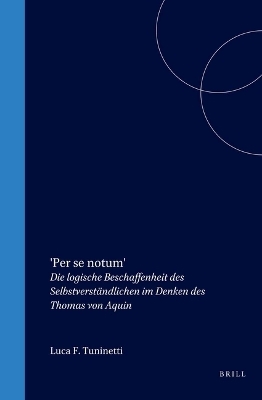
'Per se notum'
Die logische Beschaffenheit des Selbstverständlichen im Denken des Thomas von Aquin
Seiten
1995
Brill (Verlag)
978-90-04-10368-9 (ISBN)
Brill (Verlag)
978-90-04-10368-9 (ISBN)
In the Aristotelian tradition, some propostitions need no further evidencce to be proved: they are "per se nota". This work discusses the conditions that make a proposition "per se noat" according to Thomas Aquinas, focussing on the historical background and the philosophical context of Aquinas' position.
According to the Aristotelian philosophy of science, the principles of demonstation do not themselves need to be proved. Why not? What is peculiar to them? To show that, Scholasticism makes use of a phrase derived from Boethius: the principles are "per se nota" ("selbstverständlich" in the German translation adopted in this work). Thomas Aquinas in particular addresses in a few telling passages in his works the conditions that make a proposition "per se nota". This work tries to clarify the conditions stated by Aquinas. On the one hand it illustrates the context in which these conditions are introduced, namely the question of the self-evidence of the existence of God; on the other hand, it deals with the historical background and the philosophical prerequisites of Aquinas' position. All this not only provides a historically based interpretation of Aquinas' thought, but also offers a rich supply of material to reconstruct an important chapter in the history of ideas.
According to the Aristotelian philosophy of science, the principles of demonstation do not themselves need to be proved. Why not? What is peculiar to them? To show that, Scholasticism makes use of a phrase derived from Boethius: the principles are "per se nota" ("selbstverständlich" in the German translation adopted in this work). Thomas Aquinas in particular addresses in a few telling passages in his works the conditions that make a proposition "per se nota". This work tries to clarify the conditions stated by Aquinas. On the one hand it illustrates the context in which these conditions are introduced, namely the question of the self-evidence of the existence of God; on the other hand, it deals with the historical background and the philosophical prerequisites of Aquinas' position. All this not only provides a historically based interpretation of Aquinas' thought, but also offers a rich supply of material to reconstruct an important chapter in the history of ideas.
Luca F: Tuninetti (Lovere, Italy, 1963), took his degree in Philosophy at the University of Genua (1988) and his Dr. phil. at the Ludwig-Maximilians-Universität, Munich (1994). He has published an Italian translation of Aquinas' Quaestiones disputatae De potentia q. 1-3 as well as some papers on Augustine's and Aquinas' philosophy.
Einleitung
I. Das "per se notum" in den WErken des Thomas von Aquin
II. Das "per se notum" in der scholastischen Tradition vor Thomas
III. Der logische Gescichtspunkt
IV. Die Bedingungen der Selbstverstandlichkeit
Schluss
Zitierte Texte
Indices
| Erscheint lt. Verlag | 1.10.1995 |
|---|---|
| Reihe/Serie | Studien und Texte zur Geistesgeschichte des Mittelalters ; 47 |
| Verlagsort | Leiden |
| Sprache | deutsch |
| Gewicht | 557 g |
| Einbandart | Leinen |
| Themenwelt | Geisteswissenschaften ► Philosophie ► Erkenntnistheorie / Wissenschaftstheorie |
| Geisteswissenschaften ► Philosophie ► Philosophie des Mittelalters | |
| Sozialwissenschaften | |
| ISBN-10 | 90-04-10368-6 / 9004103686 |
| ISBN-13 | 978-90-04-10368-9 / 9789004103689 |
| Zustand | Neuware |
| Haben Sie eine Frage zum Produkt? |
Mehr entdecken
aus dem Bereich
aus dem Bereich
die Grundlegung der modernen Philosophie
Buch | Softcover (2023)
C.H.Beck (Verlag)
CHF 25,20
Buch | Softcover (2023)
Reclam, Philipp (Verlag)
CHF 9,80


![Was heißt Denken?. Vorlesung Wintersemester 1951/52. [Was bedeutet das alles?] - Martin Heidegger](/media/113619842)